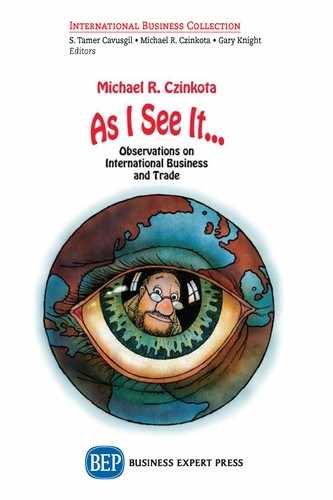The European Prayer of Saint Augustine (with Ilkka A. Ronkainen)
McDonough Business, Summer 2004

The European Union grew from 15 to 25 members on May 1. For 480 million Europeans, borders should have opened for free movement of people, ideas, and commerce. But politics and politicians have sharply restrained that movement. Many in the old Europe fear disaster from a rapid influx of people. Workers from low-income nations within the expanded European Union could come to steal the few manual jobs still held precariously by locals. Immigrants may take advantage of generous health care, unemployment, or welfare systems. And they will never go home once they discover the burial benefits. The new EU members disagree. They point to a long history in which they have been occupied, exploited, and oppressed. Yet, they have never left their countries. Quite telling is the comment of a Hungarian who points out that “we live in brick houses” to explain that families have stayed in place for centuries.
Perhaps a few excursions abroad, but never a move!
Right now, fear has the political upper hand. The old European nations have implemented special escape clauses to safeguard their systems. An abundance of regulations is aimed against the new Europeans. For up to 7 years, they will need special work permits, will be restricted in their unemployment and health care benefits, and constrained in their retirement programs. The current European expansion is remindful of the prayer of Saint Augustine: “Lord make me chaste—but not yet!” There are key drawbacks to such an arrangement. Delay introduces uncertainty, discontent, and suffering. Those seeking benefits are disappointed. Their hopes of rapid improvement and dreams of equality are shattered. After a century of misery due to accidents of history and geography, here is another painful setback. It was, after all, EU proximity that enabled the new member countries to reform their economies and political systems in the short time period since the downfall of Communism. Those seeking to postpone the effects of expansion only weaken their station. Jobs will continue to move to locations where they are performed better and at a lower price. There will be no inflow of new enthusiasm and elasticity. Rather than welcoming a shift to a new productive era, there is now a stultifying wait for the “inevitable,” discouraging the old but not encouraging the new.
Europe is different from the United States, but some post-World War II U.S. experience can offer insights. Each year, on average, every seventh American moves. Most moves are within the same county, or within the same state. But year after year, U.S. movers to a different state almost reach 3 percent of the population. That is the equivalent of the entire U.S. population transitioning to a new home state in little more than one generation. Not everybody moves equally. The wealthy and well-entrenched have very low migration patterns. Those with low household incomes are the most avid movers, seeking new opportunities. Young adults move frequently to broaden their views. All this mobility has maintained a sense of adventure in America. It has retained a spirit of flexibility and exploration. If there are no new jobs in Illinois but lots of new opportunities in Arizona, then that is where many people go. There has been the creation of entirely new regional industry and service clusters.
There remains strong local pride of place yet there is little xenophobic fear from out-of-state migrants. Vermonters do not fear Virginians! What does all this me mean for the new Europe? The opportunities to pick up and move are there, and those ready to move would fill a vital need. The decline in fertility and aging of the population will reduce the workforce by 5.5 percent by the year 2020 in the old EU. Even large increases in mobility would only represent a small population flow (which is now less than one half of one percent). People deserve to explore new options. New moves may well become an action signal for the European economy and way of thinking. This is a key opportunity to enrich the quality of life of regions and individuals. A long-term view is necessary. Migration may not result in permanent relocation. Individuals who go back home stimulate investment by setting up businesses and employing others. Many immigrants, rather than looking for a handout, want to develop their own base: home ownership, better educational opportunities, as well as health and economic security. All these moves will change cultures. After all, culture is the result of learned behavior and adjustment to new conditions. Opening up to others should bring the reward of growing flexibility, better understanding, and rising tolerance levels. Mobility has brought the power of improvisation and adjustment to the United States. Today’s world needs a Europe of courage, innovation and a willingness to take risks, with citizens that want new members to be part of, rather than apart, from them. It is time for traditionalists to discard the remaining barriers to mobility and to embrace with pride and happiness the new Europeans.
